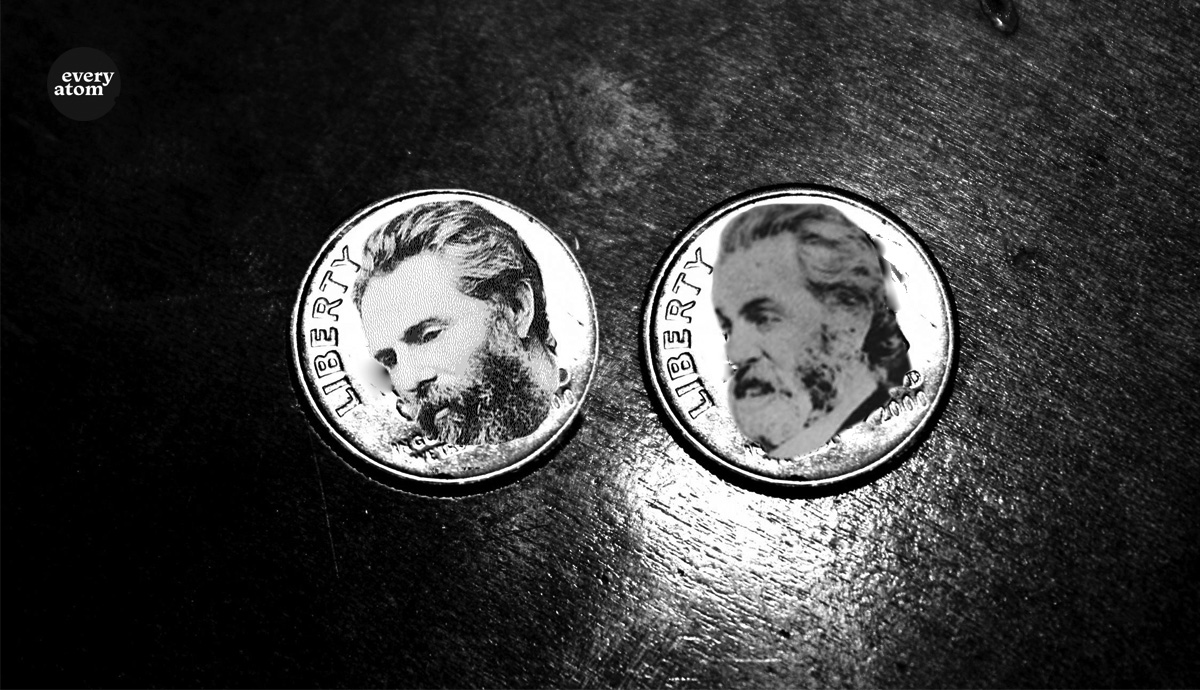Every Atom | No. 113
Introduction to Every Atom by project curator Brian Clements
Before my eyes—there, passing in slow procession along the wheeling cylinders, I seemed to see, glued to the pallid incipience of the pulp, the yet more pallid faces of all the pallid girls I had eyed that heavy day. Slowly, mournfully, beseechingly, yet unresistingly, they gleamed along, their agony dimly outlined on the imperfect paper, like the print of the tormented face on the handkerchief of Saint Veronica.
(Melville, “The Paradise of Bachelors and the Tartarus of Maids,” 1855)
Two passages, published in the same year, by men born in 1819. Two very different responses to the catastrophic and world-altering rise of global capitalism.
Melville exposed the vanquished dialectical counterparts to all our apparently pristine surfaces. His writing has a habit of confronting the imperial, self-assured white male narrator with the nightmare of violence and oppression that undergirds this figure’s very make-up. The blank page on which you write, Melville suggests here, is actually the funeral shroud of the multitude of tormented laboring women that produced it. No wonder Melville eventually became a poster-boy for American ideology critique. His writing encodes what Paul Ricoeur once called a “hermeneutics of suspicion”: look beyond the distracting surface and grasp the exploitative workings of power. Maybe on that basis we might stay awake and resist.
Whitman was also at pains to establish human labour as a kind of livid material presence within his book. But in the passage above, he imagines that it is himself locked up behind the paper: a self animatedly talking up from his reader’s lap. It’s a conceit Whitman extends at the beginning of the poem that follows the 1855 “Song of Myself” (part of what would eventually become “A Song for Occupations”)
COME closer to me,
Push close my lovers and take the best I possess,
Yield closer and closer and give me the best you possess.
This is unfinished business with me . . . . how is it with you?
I was chilled with the cold types and cylinder and wet paper between us.
I pass so poorly with paper and types . . . . I must pass with the contact of bodies and souls.
In this instance, Whitman’s speaker imagines hatching through the paper to be at our side. He “was chilled with the cold types and cylinder and wet paper” of the previous poet-reader arrangement and wants something closer. In Alan Trachtenberg’s view, this fantasy remediation of book into body enacts the poet’s ideal of exchange. Whitman’s readjusting of the proximity between poet and reader (as well as reader to the printed page) aims at an ideal correspondence, “a tallying of America with an economy of aesthetic exchange, a bartering of being for being.” We’re all on the same democratic playing field! This is me reaching out to you!
Whitman sometimes sounds like one of those exuberant, self-assured, and idiotic characters Melville was so at pains to challenge and undermine. But there is also, it seems to me, another impulse at work here, something that continually counteracts the politically idiotic myth of pure equivalence and exchange. As so often in Whitman’s poetry, neither body nor book ever fully settles into immaculate “thingness” or final “subjecthood.” The speaker lingers mid-production with that wetness. While seeming to affirm an ideal of “free” exchange, the speaker also undermines its very possibility by foregrounding a fantasy print shop assemblage of bodies, cylinders, and ink—a curiously sticky compound of wet sheets and chilling types, which only serves to further highlight the warmth and moistness of the bodies present. Just as this “ideal bartering” seems consummated through an escape from the confines of the book, the poem simultaneously draws attention to the alternative erotic arrangement of lingering between sticky wet sheets. We are left suspended somewhere in the production process in which transactions (poet to reader, labor into book, book into commodity) always remain “unfinished business.” In that unfinished space, Whitman does not offer the trenchant critique he probably ought to—we are not left with any confrontational commentary on suffering or sacrifice or alienation. But what we do encounter is the host of new intimacies and connections made possible by a world that has been violently upended by the new realities of exchange, business, and possession.
Of course, Melville also gives us these utopian moments of proximity (unforgettably, he has Ishmael share a bed with Queequeg)—but these are always shadowed by a characteristic and politically reassuring scepticism and potential critique. Reading Whitman, I always find myself weighing the cost of unself-conscious enthusiasm; unable to switch off that enthusiasm. Plunge in, Whitman urges, come what may—and let’s see what happens next.
Recommended
Nor’easter
Post-Op Appointment With My Father
Cedar Valley Youth Poet Laureate | Fall 2024 Workshop







